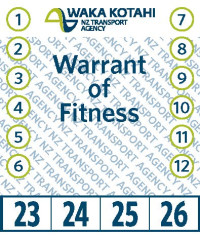
Keeping your ride legal and safe
Driving on New Zealand roads comes with the responsibility of ensuring your vehicle is safe and roadworthy. That’s where the Warrant of Fitness, or WoF, comes in. Think of it as a regular health check for your car, making sure it meets essential safety standards. Here’s a comprehensive look at what you need to know about the WoF in Aotearoa.
What is a Warrant of Fitness?
A Warrant of Fitness is a mandatory regular inspection that verifies your vehicle meets specific safety standards at the time of inspection. It covers a range of components, ensuring they are functioning correctly and aren’t a safety risk. The WoF is not a guarantee that your vehicle will remain safe until the next inspection, but it significantly reduces the likelihood of driving a dangerously faulty vehicle.
What Does the WoF Inspection Cover?
The WoF inspection covers essential safety aspects of your vehicle. Here’s a breakdown of what’s typically checked:
- Tyres: Tread depth (must be at least 1.5mm), overall condition (no cuts or bulges), and correct inflation.
- Brakes: Performance of the service and handbrake, condition of discs and pads, and brake fluid level (though not fluid condition).
- Lights: Headlights (high and low beam), taillights, brake lights, indicators, hazard lights, and reflectors – ensuring they are all working and correctly aligned.
- Steering and Suspension: Checking for excessive wear or damage in components like steering linkages, ball joints, shock absorbers, and springs.
- Windscreen and Windows: Condition of the glass (no cracks or chips that obstruct vision), and the functionality of windscreen wipers and washers.
- Seatbelts: Ensuring they are in good condition, latch and release properly, and are securely anchored.
- Airbags: Visual check for any obvious damage or deployment (note: the system’s internal electronics are not tested).
- Chassis and Body: Checking for significant rust or damage that could compromise the vehicle’s structural integrity.
- Doors and Latches: Ensuring they open and close securely.
- Horn: That it functions correctly.
- Exhaust System: Checking for leaks and excessive noise.
- Fuel System: Looking for any obvious leaks.
How Often Do You Need a WoF?
The frequency of your WoF depends on the age of your vehicle:
- New vehicles (first registered on or after 1 January 2000):
Get their first WoF before their third birthday.
Then, every 12 months. - Older vehicles (first registered before 1 January 2000):
Require a WoF every 6 months.
You can easily find the expiry date of your current WoF on the WoF sticker displayed on your windscreen.
Where Can You Get a WoF?
Warrants of Fitness can only be issued by approved WoF inspectors at designated garages and testing stations. Look for the official WoF sign. It’s a good idea to shop around as prices can vary slightly between testing stations.
What Happens if Your Vehicle Fails its WoF?
If your vehicle fails the WoF inspection, you will receive a “Failed WoF” report detailing the reasons for failure. You will then need to get the identified faults repaired and have the vehicle re-inspected.
Pink Sticker (Repair Immediately): If the faults are significant safety risks, you’ll receive a pink sticker, and you cannot legally drive the vehicle on public roads until the repairs are completed and it passes a re-inspection.
Red Sticker (Repair Required): For less critical issues, you’ll receive a red sticker, and you’ll typically have 28 days to get the faults fixed and the vehicle re-inspected. You can continue to drive the vehicle during this period, but you are responsible for ensuring the repairs are carried out.
Tips for a Smooth WoF Inspection:
- Regular Maintenance: Keeping your car well-maintained increases the chances of passing the WoF first time.
- Check the Basics: Before your WoF, do a quick check of your lights, tyres, and windscreen wipers.
- Address Known Issues: If you’re aware of any problems with your car, get them fixed before the inspection.
- Clean Your Car: While a clean car won’t guarantee a pass, it can make the inspection process smoother.
Why is the WoF Important?
The Warrant of Fitness system plays a vital role in keeping New Zealand roads safe for everyone. By ensuring vehicles meet minimum safety standards, it helps to prevent accidents caused by faulty vehicles. It’s a small investment in time and money that contributes significantly to road safety.
So, keep an eye on your WoF expiry date and ensure your vehicle gets its regular check-up. It’s not just about staying legal; it’s about ensuring your safety and the safety of others on the road.




